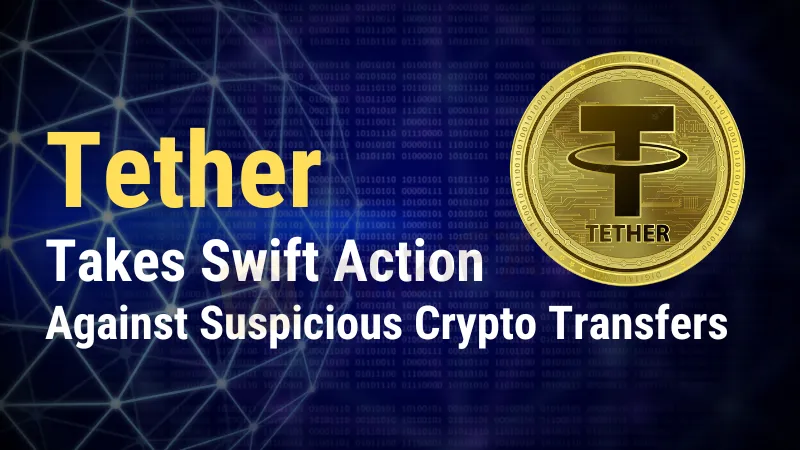UbitMarkets Review 2026: No Regulation, Direct Links to UBIT Coin Scam, and Serious Platform Risks
UbitMarkets review reveals no valid license and direct links to a fraudulent project, raising serious concerns over investor fund safety.
简体中文
繁體中文
English
Pусский
日本語
ภาษาไทย
Tiếng Việt
Bahasa Indonesia
Español
हिन्दी
Filippiiniläinen
Français
Deutsch
Português
Türkçe
한국어
العربية
Abstract:Tether takes swift action against suspicious crypto transfers, blacklisting addresses in a significant operation. Explore the measures being taken to uphold USDT's integrity and transparency in this press release.

Tether, the issuer of the world's largest stablecoin, has recently taken decisive measures to address suspicious cryptocurrency transactions. In collaboration with blockchain intelligence firm Chainargos, Tether has blacklisted over 30 cryptocurrency addresses that had received billions of USDT (Tether's stablecoin). This action marks one of the most significant operations of its kind for Tether and underscores the company's commitment to maintaining the integrity of its stablecoin ecosystem.
The blacklisted addresses in question had collectively received approximately $161 million from Whitebit, a European cryptocurrency exchange with Ukrainian roots. Many of these addresses were associated with the transfer of STUSDT, a token distributed to users after staking USDT. Chainargos had previously identified a considerable number of wallets engaged in “programmatic spamming” operations involving small STUSDT transactions, a phenomenon initially observed in August.
To combat this suspicious activity, Tether initiated its actions on December 1 by freezing 28 of these addresses. Subsequently, on December 2, an additional six addresses were blacklisted after moving more than $10 million, with assets amounting to approximately $1 million. It is noteworthy that the frozen wallets were frequently linked to the movement of STUSDT.
Tether has not provided specific reasons for these actions, but it has been actively collaborating with the U.S. Department of Justice (DOJ) to freeze funds associated with potentially illegal activities. In November, Tether voluntarily froze $225 million that was linked to human trafficking groups operating in Southeast Asia, marking it as the “largest-ever freeze of USDT.”

Tether's USDT stands as the third-largest cryptocurrency by market capitalization and enjoys widespread usage for trading and value transfer within the crypto market. These recent actions reaffirm Tether's commitment to safeguarding the reputation and security of its cryptocurrency.
Tether and its sibling cryptocurrency exchange Bitfinex agreed to drop their resistance to a Freedom of Information Act (FOIL) request made by journalists, including Zeke Faux of Bloomberg Businessweek, earlier in November.
Tether stressed in an official company statement that this move is consistent with its commitment to openness. It should be highlighted, however, that this does not imply the publication of all internal papers, citing regular business processes.
Tether took issue with Zeke Faux's prior work, noting that it occasionally ventured beyond the boundaries of traditional professional journalism. Furthermore, Tether cited instances of “biased and factually inaccurate reporting” from several media outlets, including the Wall Street Journal and Bloomberg, whose journalists are part of the FOIL request.
It is crucial to note that this is not Tether's first interaction with a FOIL request. Previously, the business tried to deny a CoinDesk request for papers linked to Tether's reserves during an investigation by the New York Attorney General (NYAG) into whether USDT was completely backed by reserves. Following a legal struggle, Tether has decided not to appeal the ruling, instead expressing a desire to work with media and authorities that adhere to ethical reporting standards and protect privacy.
Finally, Tether's recent measures reflect its commitment to ensuring the security and integrity of its cryptocurrency ecosystem. The firm continues to work with appropriate authorities to address possibly criminal behavior while stressing openness and responsible journalism in its relationships with the media.
About Tether
Tether is the creator of the world's biggest stablecoin, USDT, and a pioneer in the cryptocurrency market. Tether aspires to deliver a trustworthy and stable digital currency that supports frictionless transactions in the global cryptocurrency market, with a dedication to transparency and security.

Disclaimer:
The views in this article only represent the author's personal views, and do not constitute investment advice on this platform. This platform does not guarantee the accuracy, completeness and timeliness of the information in the article, and will not be liable for any loss caused by the use of or reliance on the information in the article.

UbitMarkets review reveals no valid license and direct links to a fraudulent project, raising serious concerns over investor fund safety.

A rare inside look at a scam compound in Myanmar reveals how a global, industrial-scale fraud network operates—using trafficked labour, fake identities, deepfakes and staged romance to systematically drain victims’ savings worldwide.

Is withdrawal issue perennial for Phyntex Markets traders like you? Does the Comoros-based forex broker give you numerous excuses to deny you withdrawals? Faced account blocks when raising Phyntex Markets withdrawal queries? Feel that the broker’s customer support service does not exist for you? Many traders have openly expressed frustration on how the broker goes about its business on review platforms. In this Phyntex Markets review article, we have shared multiple complaints against the broker. Keep reading to know the same.

Have you made multiple unsuccessful attempts to withdraw funds from your Tifia forex trading account? Registered successful trades but could not withdraw because of inadequate customer support service? Have you been facing capital losses due to severe slippage on the Tifia login? These issues have become increasingly common for traders here. Many of them have made such allegations on broker review platforms. In this Tifia review article, we have explored some scam allegations. Take a look!
